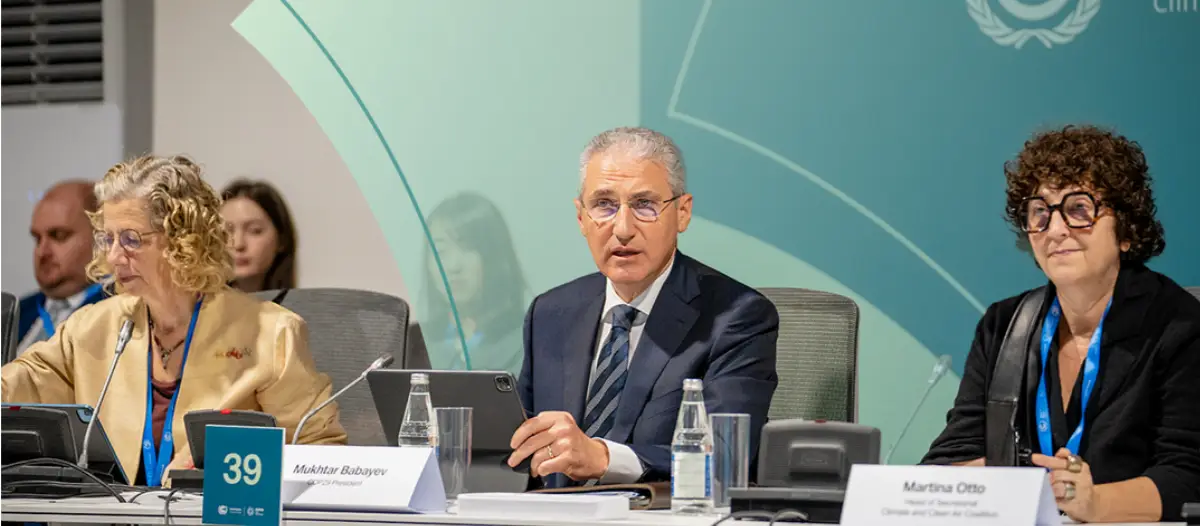
Cop29, organic waste and farmers at the center of debate
Signed by 35 countries (not Italy) the Declaration on the reduction of methane from organic waste: launched Harmoniya for agriculture

Italy is missing among the 35 countries that signed the Declaration on the reduction of methane from organic waste launched by the presidency of COP29 in Baku, Azerbaijan. The countries that account for 47% of global methane emissions from bio-waste sign their commitment to set sectoral targets for reducing methane from bio-waste. This includes 7 of the world’s top 10 organic methane emitters: the signatories, the COP29 statement explains, "commit themselves to concrete policies and roadmaps to achieve these sectoral targets on methane".
Organic waste, we remind you, is that from vegetable residues, fruit, vegetables, food scraps, egg shells, spoiled food waste: Methane emissions from the organic waste sector result from the decomposition of the same waste in anaerobic, i.e., oxygen-free environments.
The declaration, developed with CCAC, the Climate and clean air coalition convened by UNEP, the United Nations Environment Programme, builds on the work of previous COPs in supporting the implementation of the 2021 Global Methane Commitment (GMP) launched at COP26. The GMP sets a global target for reducing methane emissions by at least 30% of 2020 levels by 2030. Bio-waste is the third largest source of anthropogenic methane emissions after agriculture and fossil fuels, meaning that action in this area is crucial to achieving GMP targets.
Commenting on the Declaration on the reduction of methane from organic waste, COP29 President Mukhtar Babayev noted: "The COP29 presidency has worked to promote progress on mitigation throughout the year through the UNFCCC process and our action programme. Today’s declaration is a major step forward in helping nations implement the global methane commitment, which is an important part of the global efforts to reduce our emissions in this critical decade for climate action".
"Rapid action to reduce methane from bio-waste -adds Martina Otto, head of the CCAC Secretariat convened by UNEP- They are key to keeping the Paris Agreement goals within reach and can strengthen our global food systems while taking advantage of opportunities for a circular economy. Given that over 50% of municipal solid waste is methane-emitting organic waste and that about 1/3 of all food produced is lost or wasted each year, this statement will help to increase the ambition in prevention, Better bio-waste management and recycling, including targets in countries' upcoming climate plans, cooperation between all levels of government and finance, helping us to keep food out of landfills".
Harmoniya project for agriculture
In addition, the COP29 Presidency, in collaboration with the Food and Agriculture Organization of the United Nations (FAO), officially launched the Baku Harmoniya Climate Initiative for Farmers, To recognise the crucial role of farmers as agents of climate action.
This flagship effort, the note stresses, "will bring together on a platform the dispersed landscape of existing food and agriculture climate initiatives". In this way, the platform will help to identify gaps and opportunities for future policy and support that recognizes and empowers farmers, villages and rural communities. Building on strong partnerships with financial institutions, Harmoniya will develop an online portal and produce accessible guidelines for farmers and agricultural organisations, making it easier to find and access support".
At the same time, the Ministry of Agriculture of Azerbaijan, in collaboration with the Climate and Clean Air Coalition convened by UNEP, announced a new cooperation on developing a roadmap for reducing methane in the country’s agricultural sector. This collaboration supports Azerbaijan’s commitment to the Global Methane Pledge and aims to implement innovative and sustainable practices in livestock management and manure systems.
Kaveh Zahedi, director of the Climate Change, Biodiversity and Environment Bureau at the United Nations Food and Agriculture Organization said: "The FAO welcomes the launch of the Baku Harmoniya Climate Initiative and looks forward to working with the Azeri presidency of COP29, as well as stakeholders and partners, to accelerate transformation towards sustainable agro-food systems, inclusive and resilient. The Harmoniya initiative recognises the vital role of farmers as key agents of change and represents an unprecedented opportunity to promote concrete solutions to climate problems through agri-food systems".
EFA News - European Food Agency